 In a word “felching.”
In a word “felching.”
In 300 words, a proposed policy to supplant the Transportation Security Administration (“TSA-holes”) with a regimen requiring air travelers to kiss the naked genitals of one man and one woman, thereby gaining clearance to board a plane.
In 77,000 words: God, No! Signs You May Already Be an Atheist and Other Magical Tales (Simon & Schuster).
Late in capitalizing on the hottest publishing subject of the naughties, Jillette skips biblical analysis (almost) completely, and launches straight into his own manifesto on ethical, secular humanism.
Unlike the milquetoast secular humanism of lapsed Quakers, Penn’s secular humanism is butch, even boorish. How could Penn Jillette be otherwise? He employs obscene, hostile language and mannerisms to get your attention. Once he’s got it, he demands that you think critically.
Activist atheism (or “evangelical atheism” if you will) is not what you’d expect from the subtitle. “Signs You May Already Be an Atheist” sounds like a nod to Apatheism.
Yet the word “Apatheist” appears in the book the same number of times that Penn Jillette claims to have consumed alcohol or illegal drugs: zero. Perhaps Jillette is not acquainted with Apatheism. That’s a shame, because most atheists would feel a lot less leery about the world of “faith” if they understood that, in America, most people go to church for social purposes, whether it’s to further their insurance business, or simply to chat with friends.
Like a lot of smart people, Penn’s philosophy, and his journey to understand things, needs no Abrahamic sky god to slow him down. Religions are good only for people with no sense of direction, no sense of self, no sense of right and wrong, and/or no common sense. Penn Jillette is confident on all fronts.
If you don’t know who Penn Jillette is, you’ve been absent from popular culture for about 30 years. And if that’s the case, you too might identify with this book. It introduces us to some people who’ve never experienced popular culture, because their parents wanted them to grow up pure. (This never works. cf. Marinovich, Todd.)
God, No! promulgates no anti-god creed. It’s only barely about god. It’s hardly about atheism. Penn distinguishes his mission from those on the other side, noting that atheism must be taught only as an antidote to theistic indoctrination.
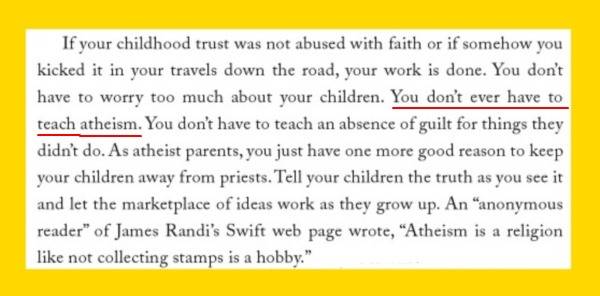
For the most part, God, No! has moved beyond simplistic belief systems to the metaphysical and the epistemological, those querulous philosophical terms that drive readers to an entirely different web page.
To keep his audience entertained, Penn couches his terms with examples from all-male Turkish bath houses, BDSM stunts, naked Elvis impersonators, the wisdom of strippers, and lots and lots of fucking.
BOMBAST
Oafish, loud and vulgar, Penn Jillette is exactly what religion seeks to quell. Religion stamps out individualism in favor of “humility”. This prostration — suppression of the ego in favor of the super-ego — is how religious nuts compel entire continents of women to dress up in beekeeper suits
Penn’s bombast serves a purpose. He wants to convert people. And for that, he needs attention.
I don’t have a problem with that. I know some people do.
When I worked at NPR’s Morning Edition, I observed the Senior Producer lament Jack Kevorkian’s approach to his cause. She thought he seemed too pre-occupied with assisted suicide. You know, as if NPR were giving any coverage to the millions of mild-mannered citizens who silently, passively hope for the right to die before they themselves wither, enveloped in pain, perpetually foggy, fragrantly damp.
Of course it’s religion that drives arcane laws about end-of-life care. But it’s not only the dying who suffer. Just think how much easier it would be to find an organ donor if the Vatican weren’t opposed to organ donation.
Penn disdains the role of a supreme being in human misery when his mother’s physical deterioration advances to full-body paralysis: “I could never have understood suffering as part of an all-powerful god’s ‘plan.’ If a god had planned that for my mom, I would have turned to Satan.”
BOMBARDING BAD IDEAS
Because the book is not about atheism as much as metaphysics, it doesn’t contain its criticism to issues of faith. It attacks outdated ideas wherever they pop up.
To me, the most interesting featured Penn’s encounter with Charles Windsor, known in England as The Prince of Wales.

I’ve pondered this concept for some time, not least when George Bush held hands with Saudi Crown Prince Abdullah, or any time Barack Obama bows to… just about anybody.
Of this year’s royal honeymoon, I imagined Bill and Kate Windsor choosing America because they hoped to be treated like people. “Hello Mr. Windsor” seems sufficiently prostrating, don’t you think?
ATTACKING THE SECULAR RELIGIOUS ESTABLISHMENT
Penn shits his own nest when he expands his war on ideology to a second front, attacking his ostensible (i.e. liberal) audience for the religion they haven’t abandoned.
On the redistribution of wealth, Penn uses his friend Seth McFarlane (Family Guy) as an example.
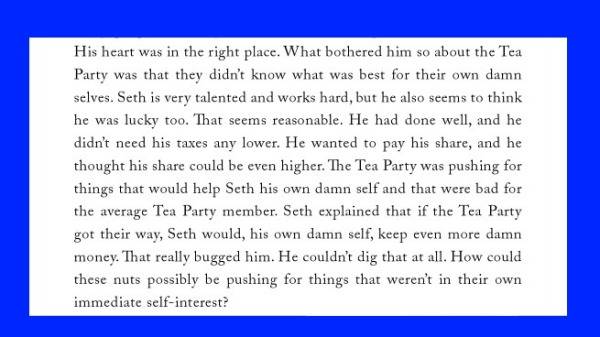
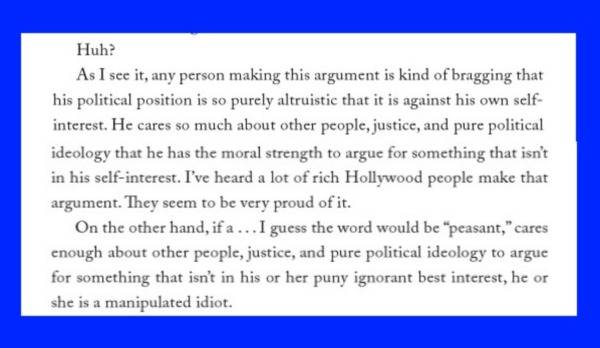

This speaks directly to my purpose, and perhaps to my fellow centrists. We wonder whether one of the major parties will ever abandon its ideological albatross (wealth redistribution for Democrats, Jesus and abortion for Republicans) and thus capture the 60% majority that gets things done in this country.

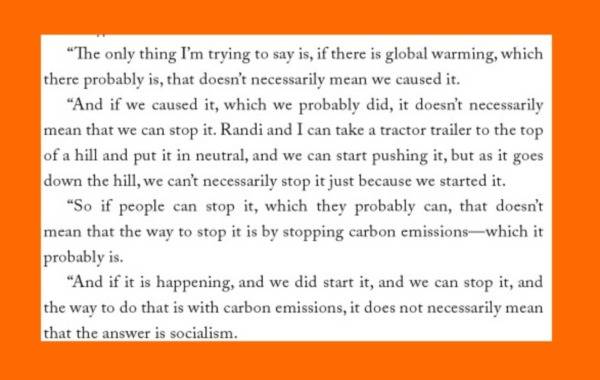
Persuasion is the problem. It’s easy, fun and popular to pillory churchy fundamentalists. Lampooning leftists can be hilarious. But can you ever change their minds?
I don’t believe God, No! will convert anybody. But like the rest of the atheist canon, it might help someone feel less guilty about thinking rationally in the face of overwhelming cultural pressure.
THE CHOSEN PEOPLE
And speaking of cultural pressure…
Since 9/11, reams of ink and trees were sacrificed to bring us analyses of crazy Muslims abroad, and crazy Christians at home. God, No! skewers no particular group at length. But it makes one brief, elegant condemnation of the Israelites.
There aren’t many reasoned condemnations of Jews in print. Plenty of wacko “Christ killer” et al mumbo jumbo, but nothing that normal people might find persuasive. Ironically, it seems as though the tribe that condemned the golden calf is religion’s last sacred cow.
For years I’ve peppered any conversation about nationalism, ethnocentrism, the Shoah and persecution generally with the question, “why the Jews?” I’m not asking why they were “chosen.” I want to know why they were ostracized.
It’s not good enough, in my mind, to teach children that Hitler was insane. How did he manage to persuade an entire nation (and the ex-king of England, among others) that ridding a continent of Jews was a reasonable application of government power? Why did these people accept, with few reservations, that all of Jewry was a menace to polite society?

This question is verboten is some circles. That’s the nature of a sacred cow. If you seek any rational basis for antisemitism, you risk an unfavorable branding. Last week’s News-Gazette featured a story in which local eighth-graders asked ‘Why do they hate the Jews so much?'” But neither the story, nor its subjects tackled the question.
I think Penn Jillette has finally revealed the answer.
First, he distinguishes Judaism from “racial” Jewishness.
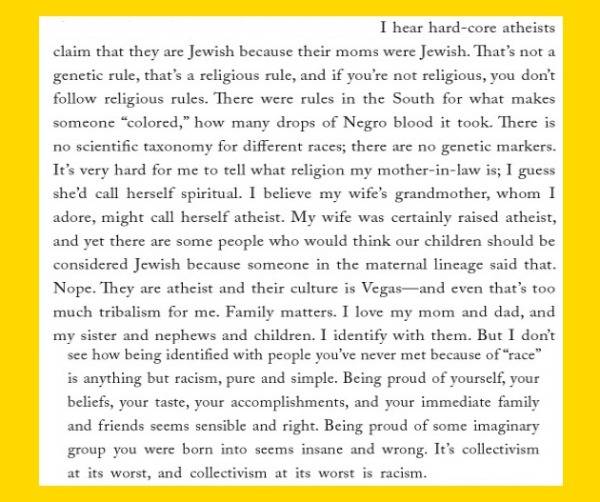
Penn then recounts a fascinating meal at Traif, the Williamsburg hot-spot where ex-Jews celebrate apostasy and eat bacon. He meets with former Hasids. They divulge all of orthodox Judaism’s secret handshakes and passwords.
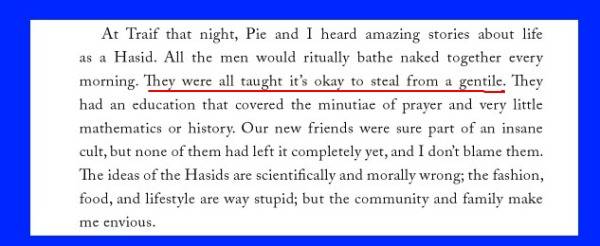
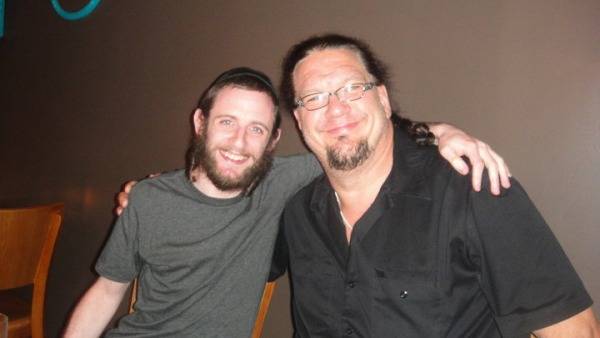 Luzer Twersky & Penn Jillette at Traif
Luzer Twersky & Penn Jillette at Traif
I think these passages are the most important in the book. Sacred cow status doesn’t help anybody. If the question “why the Jews?” is ineffable, rhetorical or simply faux pas, the world’s eighth-graders must decide whether they will hate Jews because they’re Jews, and that makes no sense.
Given the facts, most eighth-graders can work out the right answer. Sure, we should detest Jews who adhere to misanthropic traditions. We should treat the rest of the tribe the way we treat everybody else (with a guarded optimism that can easily break into small talk, or cat fights).
Intriguingly, that’s Penn’s big picture. For all the bombast and obscenity, he wants us to be gentle, to love one another.
It’s a good read.








